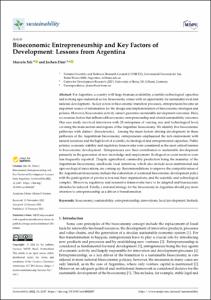Bioeconomic Entrepreneurship and Key Factors of Development: Lessons from Argentina

Bioeconomic Entrepreneurship and Key Factors of Development: Lessons from Argentina

| dc.contributor.author | Dürr, Jochen | |
| dc.contributor.author | Sili, Marcelo | |
| dc.date.accessioned | 2022-03-01T08:24:17Z | |
| dc.date.available | 2022-03-01T08:24:17Z | |
| dc.date.issued | 21.02.2022 | |
| dc.identifier.uri | https://hdl.handle.net/20.500.11811/9651 | |
| dc.description.abstract | For Argentina, a country with large biomass availability, scientific-technological capacities and a strong agro-industrial sector, bioeconomy comes with an opportunity for sustainable local and national development. As key actors in bioeconomic transition processes, entrepreneurs become an important source of information for the design and implementation of bioeconomic strategies and policies. However, bioeconomic activity cannot guarantee sustainable development outcomes. Here, we examine factors that influenced bioeconomic entrepreneurship and related sustainability outcomes. Our case study involved interviews with 23 enterprises of varying size and technological level, covering the main sectors and regions of the Argentine bioeconomy. We identify five bioeconomic pathways with distinct characteristics. Among the main factors driving development in these pathways of the Argentinian bioeconomy, entrepreneurs emphasized the rich endowment with natural resources and the high level of scientific, technological and entrepreneurial capacities. Public policies, economic stability and regulatory frameworks were considered as the most critical barriers to bioeconomic development. Entrepreneurs saw their contribution to sustainable development primarily in the generation of new knowledge and employment. Ecological or social motives were less frequently reported. Despite agricultural commodity production being the mainstay of the Argentinian bioeconomy, small-scale local initiatives, which also include socio-institutional and agro-ecological innovations, are coming up. Recommendations to improve the competitiveness of the Argentinean bioeconomy include the elaboration of a national bioeconomic development policy with the participation of private actors and their organizations, and the scientific and technological complex. Moreover, regulatory and normative frameworks have to be adapted and bureaucratic obstacles be reduced. Finally, a national strategy for the bioeconomy in Argentina should pay more attention to entrepreneurship as a driver of transformation. | en |
| dc.format.extent | 28 | |
| dc.language.iso | eng | |
| dc.rights | Namensnennung 4.0 International | |
| dc.rights.uri | http://creativecommons.org/licenses/by/4.0/ | |
| dc.subject | bioeconomy | |
| dc.subject | sustainability | |
| dc.subject | entrepreneurship | |
| dc.subject | innovations | |
| dc.subject | local development | |
| dc.subject | biofuels | |
| dc.subject.ddc | 333.7 Natürliche Ressourcen, Energie und Umwelt | |
| dc.title | Bioeconomic Entrepreneurship and Key Factors of Development: Lessons from Argentina | |
| dc.type | Wissenschaftlicher Artikel | |
| dc.publisher.name | MDPI | |
| dc.publisher.location | Basel | |
| dc.rights.accessRights | openAccess | |
| dcterms.bibliographicCitation.volume | 2022, 14 | |
| dcterms.bibliographicCitation.issue | 2447 | |
| dc.relation.doi | https://doi.org/10.3390/su14042447 | |
| dcterms.bibliographicCitation.journaltitle | Sustainability | |
| ulbbn.pubtype | Zweitveröffentlichung | |
| dc.version | publishedVersion | |
| ulbbn.sponsorship.oaUnifund | OA-Förderung Universität Bonn |
Files in this item
This item appears in the following Collection(s)
-
Publikationen (33)




